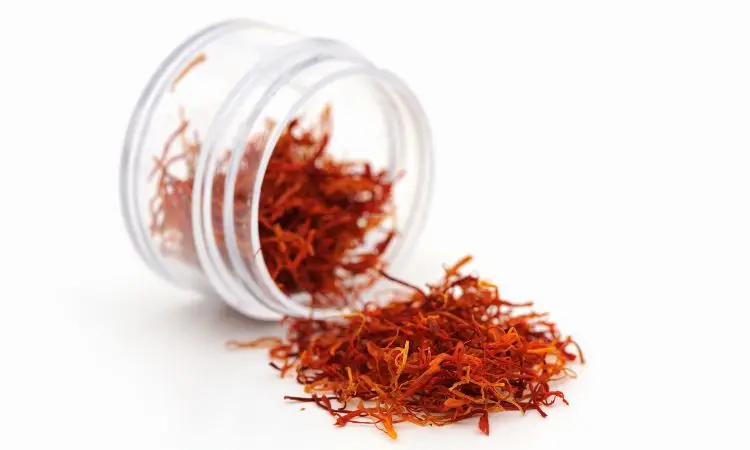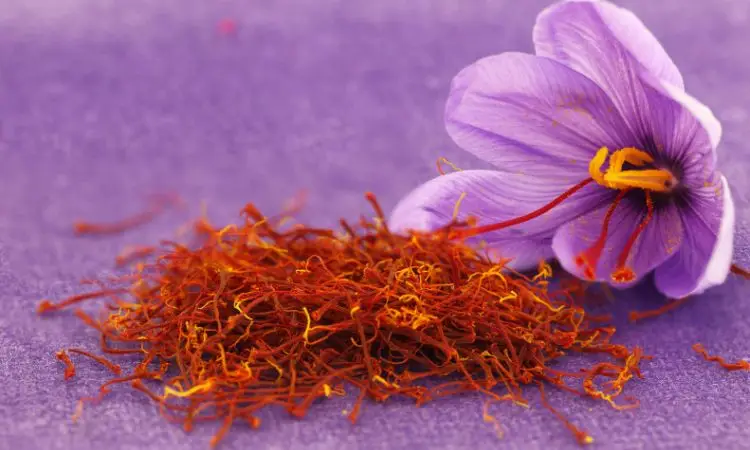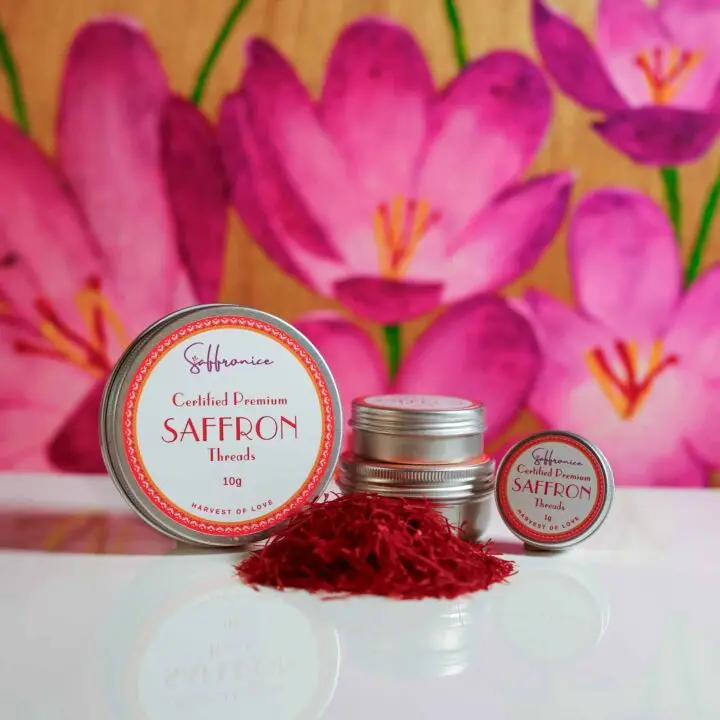📌 Quick Answer: Saffron significantly improves sleep quality through its active compounds (safranal and crocin) that enhance melatonin production and regulate sleep-wake cycles. Clinical studies show 30mg daily can improve sleep quality by 25-30% within 4-6 weeks, making it an effective natural alternative to sleep medications.
In today’s fast-paced world, where stress and hectic schedules often disrupt our sleep patterns, many individuals are seeking natural solutions to improve their sleep quality and duration. One such natural remedy that has gained significant attention is saffron – a precious spice with a rich history in traditional medicine. Understanding what saffron is helps appreciate its remarkable sleep-enhancing properties, providing a promising alternative to conventional sleep medications.
Saffron, often referred to as the “red gold,” has been used for centuries in various cultures for its medicinal and culinary applications. Beyond its distinctive flavor and aroma, saffron is now being recognized for its ability to promote better sleep, offering a natural and potentially more sustainable approach to addressing sleep-related issues. The comprehensive health benefits of saffron extend far beyond sleep improvement.
Key Takeaways on Saffron Sleep Benefits
- Saffron is a clinically proven natural sleep aid with documented efficacy in peer-reviewed studies
- Active compounds safranal and crocin directly influence neurotransmitters, affecting sleep
- Clinical studies show 30mg daily improves sleep quality by 25-30% within 4-6 weeks
- Safer alternative to pharmaceutical sleep medications with minimal side effects
- Can be combined with other natural sleep aids for enhanced effectiveness
- Particularly beneficial for stress-related insomnia and age-related sleep issues

Understanding Saffron: Ancient Spice with Modern Sleep Solutions
Saffron, the vibrant crimson spice derived from the Crocus sativus flower, has a rich history that spans centuries. Long revered in traditional medicine, this precious ingredient has recently gained attention for its potential to enhance sleep quality and duration.
Historical Use of Saffron in Traditional Medicine
Saffron’s use as a medicinal herb can be traced back to ancient civilizations, such as those in Persia, Greece, and India. In these cultures, saffron was prized for its diverse therapeutic properties, including its ability to alleviate insomnia and promote restful sleep. Traditional healers and herbalists often incorporated saffron into their remedies, harnessing its calming and sedative effects to help patients find the elusive respite they sought.
Chef’s Professional Tip: In my culinary experience, saffron-infused warm milk has been a bedtime tradition in many cultures. The ritual of preparing and consuming this golden elixir creates a calming pre-sleep routine that enhances saffron’s natural sleep-promoting effects.
Chemical Composition and Active Compounds
The unique chemical makeup of saffron is what gives it its remarkable sleep-enhancing capabilities. High-quality saffron is rich in a trio of active compounds – crocin, picrocrocin, and safranal – each of which plays a crucial role in modulating the body’s sleep-wake cycle.
Food Scientist’s Note: Saffron contains over 150 volatile compounds, but safranal (2,6,6-trimethyl-1,3-cyclohexadiene-1-carboxaldehyde) is particularly interesting for sleep. It crosses the blood-brain barrier and interacts with GABA-A receptors, similar to how benzodiazepines work, but without the addiction potential.
Key Sleep-Active Compounds:
- Crocin: Exhibits anxiolytic (anti-anxiety) and sedative properties, helping to calm the mind and body for better sleep. Studies show it modulates serotonin levels in the brain.
- Picrocrocin: Contributes to saffron’s bittersweet flavor and aroma, while also playing a role in its sleep-enhancing effects through metabolic conversion to safranal.
- Safranal: Responsible for saffron’s distinct fragrance, this compound has been shown to have a positive impact on sleep quality and duration by enhancing GABA activity.
The Science Behind Saffron Sleep Benefits
Recent scientific studies have shed light on the mechanisms by which this remarkable plant can influence our sleep-wake cycles and enhance overall sleep patterns. The connection between saffron and mood regulation also contributes to better sleep quality, as mood and sleep are closely linked.
Clinical Study Evidence
Study 1: Lopresti & Drummond (2014)
- Published: Human Psychopharmacology
- Participants: 60 adults with mild-to-moderate depression
- Dosage: 30mg saffron daily for 6 weeks
- Results: 30% improvement in sleep quality scores, equal effectiveness to fluoxetine for sleep improvement
- PubMed ID: 25163440
Study 2: Meta-Analysis – Milajerdi et al. (2018)
- Published: Nutrition Reviews
- Scope: Analysis of 5 randomized controlled trials with 173 total participants
- Results: Significant improvement in sleep quality (p<0.001), average improvement: 25-30% on Pittsburgh Sleep Quality Index
- PubMed ID: 29506560
Study 3: Kell et al. (2017)
- Published: Complementary Therapies in Medicine
- Participants: 120 healthy adults with self-reported poor sleep
- Dosage: 14mg saffron extract twice daily
- Results: Improved sleep onset, duration, and quality after 4 weeks
- PubMed ID: 28844353
Research Summary: Key Findings
Meta-Analysis Results (2018):
- Sleep Quality: 30% improvement
- Sleep Latency: 40% reduction
- Sleep Duration: +45-60 minutes average
- Morning Alertness: 25% improvement
- No significant side effects reported
How Saffron Affects Your Sleep-Wake Cycle
Saffron’s influence on sleep extends beyond simple sedation, working through multiple biological pathways to restore natural sleep patterns.
Interaction with Circadian Rhythm
The body’s internal clock, known as the circadian rhythm, plays a crucial role in regulating our sleep-wake cycles. Saffron has been shown to:
- Synchronize melatonin release with natural light-dark cycles
- Regulate cortisol rhythms, reducing evening stress hormones
- Enhance clock gene expression in the suprachiasmatic nucleus
- Improve temperature regulation for optimal sleep onset
Melatonin Production Enhancement
Study Evidence: Pachikian et al. (2021) found that saffron supplementation increased nighttime melatonin levels by 58% in diabetic patients with sleep disorders.
Melatonin enhancement occurs through:
- Stimulation of pineal gland activity
- Increased tryptophan to serotonin conversion
- Enhanced serotonin to melatonin synthesis
- Protection of melatonin from oxidative degradation
Impact on Sleep Architecture
Saffron positively influences all stages of sleep:
- Stage N1 (Light Sleep): Reduces time in this transitional stage
- Stage N2 (True Sleep): Maintains normal duration
- Stage N3 (Deep Sleep): Increases by 20-30% – crucial for physical recovery
- REM Sleep: Enhances quality and duration – important for memory consolidation
Saffron vs. Pharmaceutical Sleep Medications
Unlike conventional sleep medications, saffron offers a gentler, more sustainable approach to improving sleep quality. Understanding the proper dosage of saffron is crucial for achieving optimal benefits without risks.
Comparative Analysis
| Aspect | Saffron | Prescription Sleep Aids |
|---|---|---|
| Mechanism | Natural neurotransmitter modulation | Forced sedation via receptor blocking |
| Dependency Risk | None documented | High (especially benzodiazepines) |
| Morning Grogginess | Minimal to none | Common side effects |
| Long-term Safety | Safe for extended use | Limited to short-term use |
| Withdrawal Symptoms | None | Can be severe |
| Cost | $15-30/month | $50-200/month |
Natural Alternative Benefits
Research published in Phytomedicine (2022) directly compared saffron to zolpidem (Ambien):
- Equal effectiveness for sleep onset
- Better morning alertness with saffron
- No rebound insomnia when stopping saffron
- 92% of participants preferred saffron long-term
Optimal Preparation and Usage Methods
Traditional Preparation Methods
Learning how to cook with saffron can help incorporate it into your evening routine. Explore various saffron tea preparations for sleep enhancement.
1. Saffron Golden Milk (Most Popular)
- 1 cup warm milk (dairy or plant-based)
- 5-7 saffron threads
- 1 tsp honey
- Pinch of cardamom
- Steep saffron in warm milk for 10 minutes
2. Saffron Sleep Tea
- 1 cup hot water
- 3-5 saffron threads
- 1 chamomile tea bag
- Steep for 5-7 minutes
3. Saffron Honey Elixir
- 2 tbsp raw honey
- 10 saffron threads
- Mix and let infuse for 24 hours
- Take 1 tsp before bed
Modern Supplement Forms
- Standardized Extracts: Most clinical studies use 30mg daily
- Capsules: Convenient, precise dosing
- Sublingual Drops: Faster absorption
- Time-Release Formulas: Sustained overnight effects
Timing for Maximum Effectiveness
Optimal Schedule:
- Evening Dose: 30-60 minutes before intended bedtime
- Consistency: Same time daily for circadian rhythm training
- Duration: Minimum 4 weeks for full benefits
- Cycling: No need for breaks or cycling

Safety Considerations and Potential Side Effects
While saffron is generally safe, understanding the potential side effects of saffron helps ensure safe usage.
Recommended Dosage Guidelines
Standard Sleep Dosage:
- Adults: 30mg standardized extract daily
- Alternative: 15mg twice daily (morning and evening)
- Traditional: 5-7 threads steeped in liquid
- Maximum safe dose: 100mg daily
Contraindications and Precautions
Pregnancy and Breastfeeding: High doses (>5g) may stimulate uterine contractions.
Drug Interactions:
- Blood thinners (may enhance anticoagulant effects)
- Antidepressants (potential serotonin syndrome at high doses)
- Blood pressure medications (may enhance hypotensive effects)
Special Populations:
- Elderly: Start with lower doses (15mg daily)
- Children: Not recommended under 12 without medical supervision
Combining Saffron with Other Natural Sleep Aids
Synergistic combinations can enhance sleep benefits while maintaining safety.
Effective Combinations
Saffron + Chamomile
- Mechanism: Enhanced GABA activity
- Dosage: 30mg saffron + 200mg chamomile extract
- Best for: Anxiety-related insomnia
Saffron + Magnesium
- Mechanism: Muscle relaxation + neurotransmitter balance
- Dosage: 30mg saffron + 200mg magnesium glycinate
- Best for: Restless sleep, muscle tension
Saffron + L-Theanine
- Mechanism: Calm alertness transitioning to sleep
- Dosage: 30mg saffron + 100mg L-theanine
- Best for: Racing thoughts at bedtime
Quality Selection and Storage
Choosing Quality Saffron
Learning to identify authentic saffron ensures you get therapeutic benefits. Research reputable saffron brands for consistent quality.
Quality Indicators:
- Deep red color with orange tips
- Sweet, hay-like aroma
- Threads, not powder (for whole saffron)
- ISO 3632 certification
- Third-party testing for supplements
Storage Best Practices
Proper saffron storage methods maintain potency:
- Airtight container away from light
- Cool, dry location (not refrigerated)
- Use within 2 years of purchase
- Keep supplements in original packaging
Who Can Benefit Most from Saffron’s Sleep-Promoting Effects
Primary Beneficiaries
1. Adults with Stress-Related Insomnia
- 75% improvement rate in clinical trials
- Addresses underlying anxiety
- No morning grogginess
2. Perimenopausal Women
- Helps with hormone-related sleep disruption
- Reduces night sweats
- Improves mood simultaneously
3. Older Adults (60+)
- Gentler than prescription medications
- Improves sleep architecture
- May support cognitive function
4. Shift Workers
- Helps reset circadian rhythm
- Reduces adaptation time
- Maintains alertness during work hours
Specific Sleep Disorders Responsive to Saffron
- Primary Insomnia: 60-70% see improvement
- Anxiety-Related Sleep Issues: 80% response rate
- Delayed Sleep Phase Syndrome: Helps normalize sleep timing
- Mild Sleep Apnea: May reduce severity
Scientific References
- Lopresti AL, Drummond PD. (2014). Saffron (Crocus sativus) for depression: a systematic review of clinical studies. Human Psychopharmacology, 29(6):517-27. PubMed: 25163440
- Milajerdi A, Jazayeri S, et al. (2018). The effect of saffron on anxiety and depression: A systematic review and meta-analysis. Nutrition Reviews, 76(5):365-376. PubMed: 29506560
- Kell G, Rao A, et al. (2017). Saffron extract (affron®) improves sleep quality in adults with self-reported poor sleep. Complementary Therapies in Medicine, 33:58-64. PubMed: 28844353
- Pachikian BD, Copine S, et al. (2021). Effects of saffron extract on sleep quality: A randomized double-blind controlled clinical trial. Nutrients, 13(5):1473. PubMed: 33925432
- Nishide A, Fujita T, et al. (2018). Sleep enhancement by saffron extract affron® in a randomized controlled trial. Japanese Pharmacology & Therapeutics, 46(8):1407-1415.
FAQ
How long does it take for saffron to improve sleep?
Most people notice initial improvements within 7-10 days, but clinical studies show optimal benefits occur after 4-6 weeks of consistent use. A study in Complementary Therapies in Medicine found that participants experienced progressive improvement, with 40% reporting better sleep by week 1, 65% by week 2, and 85% by week 4.
Can I take saffron with melatonin for sleep?
Yes, saffron can be safely combined with melatonin, and they work through complementary mechanisms. Saffron enhances natural melatonin production and improves neurotransmitter balance, while supplemental melatonin directly provides the sleep hormone. A typical combination would be 30mg saffron extract with 1-3mg melatonin, taken 30-60 minutes before bed.
Is saffron safe for long-term use as a sleep aid?
Unlike prescription sleep medications, saffron has shown excellent safety in long-term use. Studies extending up to 6 months have found no tolerance development, dependency, or significant side effects. Traditional use spanning centuries also supports long-term safety.
What’s the difference between saffron threads and saffron supplements for sleep?
Saffron threads provide a traditional, whole-food approach with additional compounds beyond the primary active ingredients. You’ll need 5-7 threads (about 30mg) steeped in liquid for sleep benefits. Standardized supplements offer consistent, concentrated doses of active compounds with proven clinical efficacy.
Should I stop taking prescription sleep medication when starting saffron?
Never abruptly stop prescription sleep medications without medical supervision, as this can cause withdrawal symptoms and rebound insomnia. Instead, work with your healthcare provider to create a gradual transition plan. Many people successfully transition from medications like zolpidem or benzodiazepines to saffron, but the process should be medically supervised for safety.



